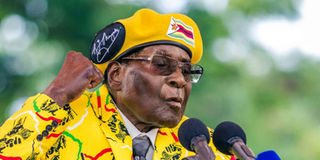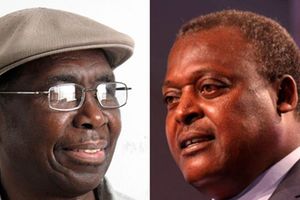Premium
You want to be dictator for life in Africa? Make everyone rich

Robert Mugabe ruled Zimbabwe for 37 years until he was finally ousted in November 2017.
What you need to know:
- People who have nothing will be happy to get an Sh500 bribe from a politician for their vote. But for the working-class voter, you have to fork out at least Sh5,000.
- The flipside of this “poor people are easier to control” notion is that the better off and more educated ones are harder to crack.
For a long time, I was of the view that one of the many reasons Africa is the poorest continent (at least in material possessions) is because it is good politics for its rulers. It seemed like poor people were easier to control as they lacked the resources to expand their horizons. They couldn’t afford things like a radio or newspaper or travel and “see things for themselves”, as good Africans say.
Male power (patriarchy) always understood this and came with the notion that “a woman’s place is in the kitchen”. Many think the idea was that women should only cook, mop and have babies. No. Men feared women would expand their knowledge and challenge the world order.
And, indeed, when women could go to school, work outside the home and travel, it was the beginning of the end for male power. It is why, in parts of Africa, tradition still forbids women from riding bicycles. The humble bicycle has been subversive. When a village woman can ride to the next ridge and sees a whole new world out there, her man’s power is threatened.
So it is with poverty. And poverty keeps the cost of politics down. People who have nothing will be happy to get an Sh500 bribe from a politician for their vote. But for the working-class voter, you have to fork out at least Sh5,000. The flipside of this “poor people are easier to control” notion is that the better off and more educated ones are harder to crack.
In recent years, as competitive politics and contested elections spread across most of Africa, there were many moments when I wasn’t sure that my line was valid.
Political engagement
Everybody probably has a story of a bloke or woman with a PhD “behaving worse than an uneducated villager”, to use another popular African expression. Now, those researchers who will not let us live peacefully in our settled world views suggest that not only is my view not valid but it could be downright wrong or simplistic.
The Economist just published a story examining a recent study by researchers at Indiana University and Susquehanna University, in the US, that found that in Sub-Saharan Africa, increased access resulted in mostly less political engagement.
Although South Africa is one of the most electrified countries in the region (85 per cent of the population is connected to the grid), the magazine reports, people there tend to be less politically active. They protest less or are less likely to contact their local representative than their poorer regional neighbours. But there is always a problem in these scenarios, as we all know. Did access to electricity cause the fall in political activity, or was it merely correlation?
In Ghana, the research results suggested that electricity access did cause a dip in political engagement. “Once they got access to electricity, Ghanaians were more likely to stay at home — watching television, for example — instead of socialising with neighbours, where they might pick up news of problems in the community. And of course, with electricity, they may have felt more satisfied in their home lives and therefore less inclined towards activism.”
Rich people
It gets better. Ghanaians who have money and can set up their electricity without government help (the solar panel on the roof), paid for their street lights or purchased a generator didn’t think an elected official was willing or able to meet their needs; so, they didn’t bother with politics.
“The only exception to the trend, in Ghana and elsewhere in the region, was for people who were already involved in civil society, such as women’s organisations,” the researchers noted. “For them, living in an electrified neighbourhood was associated with increased political activity.”
In the detailed study, the researchers say the findings were contrary to their hypothesis. They note that from the Ghana case “we theorise a causal mechanism that refutes classic understandings of modernisation theory. Rather than modern amenities increasing engagement, electricity access is associated with disengaging from some traditional types of political participation as citizens enjoy the benefits of electricity at home. Some of these benefits, which include cooled air, television and smartphones, potentially enable new modes of digital participation.”
Indeed, and so you have your keyboard warriors, the social media revolutionaries and podcast democrats.
We had always known some of this. It’s a common criticism that rich people and the upper-middle class are often pro-status quo because they don’t want to lose their goodies. Now, it has been demonstrated starkly for our leaders. If they want to control the people, to be ‘President for Life’ without much challenge, they should try the very opposite of what they’ve been doing : Make all their citizens reasonably well off or push policies that make it possible.
Mr Onyango-Obbo is a journalist, writer and curator of the Wall of Great Africans. @cobbo3





